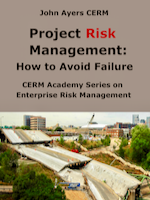 Financial planners would advise you that the key to a successful retirement are four cornerstones:
Financial planners would advise you that the key to a successful retirement are four cornerstones:
- Income
- Liquidity
- Security
- Growth
I would advise you that the four knowledge cornerstones of effective project risk management are key to a successful project. They are:
- Project Management
- Earned Value Management
- Risk management
- Subcontract Management
Project management has been used successfully for years on projects such as: Pyramids of Giza; Great Wall of China; and the Panama Canal. Knowledge of project management is essential for successful projects today and in the future because the majority of work is and will be will be centered on projects.
Project management is the most important knowledge cornerstone because it addresses the known risks of a project (scope, cost, schedule, and quality). Based on various studies, the known risks are the major reason for project failure. In addition, knowledge of project management is essential for setting up and executing a project.
This paper focuses on the project management knowledge cornerstone.
PROJECT MANAGEMENT OVERVIEW
The project management process comprises the following basic phases:
- Proposal Phase
- The planning phases
- Execution phase
Proposal Phase
The proposal stage is the most critical phase because the budget and schedule, are fixed when the officers of the company sign off on the proposal attesting it is valid. The only changes that can be made to the budget and schedule are those negotiated with the customer after contract award.
It is important to conduct a very thorough and extensive risk assessment during the proposal phase to identify the budget and schedule required to mitigate the risks. The risk cost and schedule have to be in the proposed cost to ensure the proposal is valid.
It is essential to generate a scope and requirements compliance matrix to confirm that all requirements in the contract SOW (statement of work) and specification has been accounted for in the proposal.
Subcontractors represent a significant known risk to the project. Typically, the customer issues an RFP (request for proposal) with a 60-day due date This means, a subcontractor usually has 3 weeks (or may 4) to complete and submit their proposal. This is insufficient time for a complete firm proposal. To mitigate this, the subcontractor’s cost and schedule are added into the proposal with fudge factors to mitigate the softness of the subcontractor’s proposal.
Many projects do not do due diligence with the scope, cost and schedule in the proposal stage resulting in a contract with built in known risks that are partially realized. This makes it very difficult for the project manager to achieve project success. Experienced project and proposal managers know the pit falls and deal with them successfully.
This is the phase that if conducted properly ought to minimize the impact of the known risks. If done poorly, the chances of excelling on the project is low.
Planning Phase
The preliminary planning is done in the proposal phase where the preliminary project documents are generated. After contract award, the final planning occurs. All preliminary project documents are updated with the negotiated changes and finalized. Staffing plans are finalized with names. Work authorizations are issued by the project manager. A kick-off meeting is held with management (typically with customer in attendance) that presents the detail plan for the project. Once approved by management, work is authorized and the execution phase begins.
Execution Phase
This phase usually starts with an SSR (systems requirements review) with the customer to ensure everyone is on same page. The next step is usually the concept review held with the customer to ensure it is acceptable. A period of 3-6 months follows for the preliminary design followed by a PDR (preliminary design review). After customer approval of the PDR, the final design phase starts and runs 3-6 months typically. A CDR (critical design review) is held and if approved by the customer, the drawings and other documents are released to CM (configuration management). Typically, a production phase follows completion of the design.
SUMMARY
The program management knowledge cornerstone is the most important because if they perform poorly in the proposal phase, the phase where the sites known risks (scope, cost, schedule, and quality) are defined, then the probability of success of the projects is low. Studies have shown that most projects fail because of the known risks. It is very important for a successful project, to have an experienced project manager (and proposal manager) that know and have excellent program management knowledge and skills.
Post Note
 I authored a new book entitled ‘Project Risk Management’. The basis of the book is the four cornerstones. The book contains much more detail, examples, and risk stories. It is easy to read and understand. Visit my website-projectriskmanagement.info. It includes a link to Amazon and my book as well as the technical papers I have written over time.
I authored a new book entitled ‘Project Risk Management’. The basis of the book is the four cornerstones. The book contains much more detail, examples, and risk stories. It is easy to read and understand. Visit my website-projectriskmanagement.info. It includes a link to Amazon and my book as well as the technical papers I have written over time.
Bio:
John earned a BS in Mechanical Engineering and MS in Engineering Management from Northeastern University. He has a total of 44 years’ experience, 30 years with DOD Companies. He is a member of PMI (project Management Institute). John has managed numerous firm fixed price and cost plus large high technical development programs worth in excessive of $100M. He has extensive subcontract management experience domestically and foreign. John has held a number of positions over his career including: Director of Programs; Director of Operations; Program Manager; Project Engineer; Engineering Manager; and Design Engineer. His technical design areas of experience include: radar; mobile tactical communication systems; cryogenics; electronic packaging; material handling; antennas; x-ray technology; underwater vehicles; welding; structural analysis; and thermal analysis. He has experience in the following areas: design; manufacturing; test; integration; selloff; subcontract management; contracts; risk and opportunity management; and quality control. John is a certified six sigma specialist, certified level 2 EVM (earned value management) specialist; certified CAM (cost control manager).